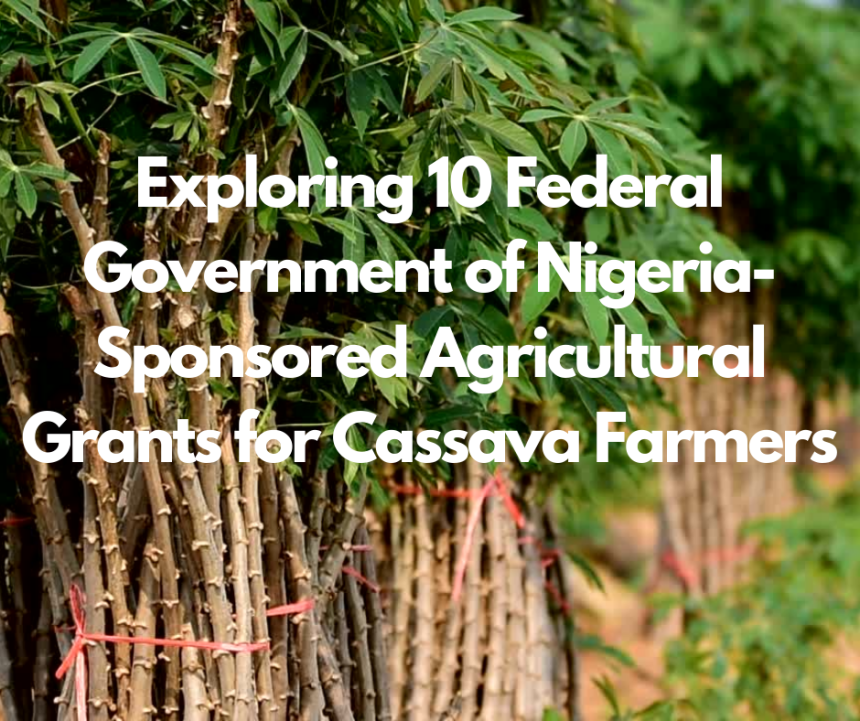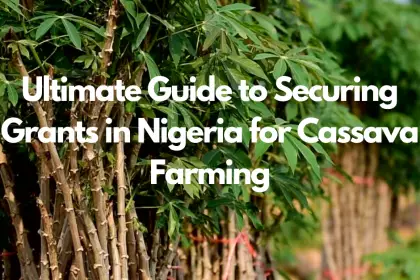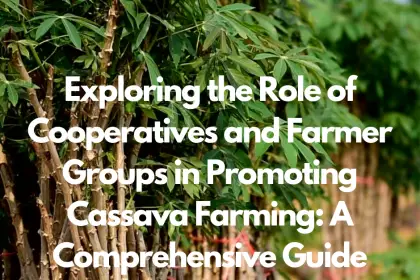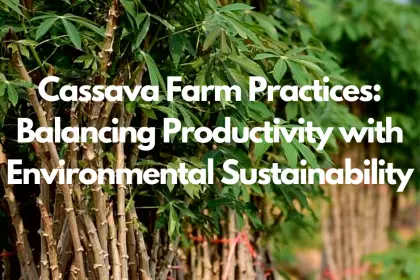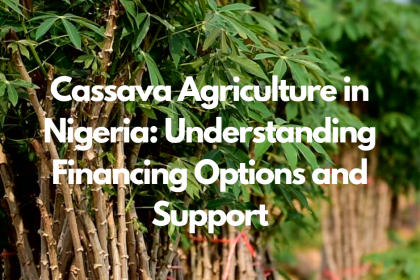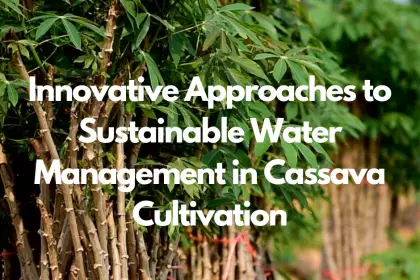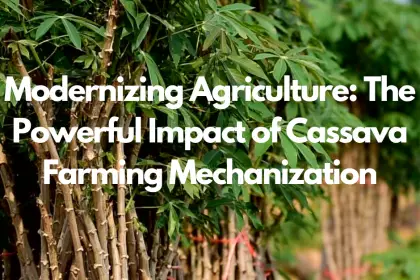Nigeria leads as the world’s largest producer of cassava, boasting an annual production exceeding 34 million tonnes. This agricultural prowess underscores the importance of cassava not only to Nigeria’s economy but also to its food security. The federal government of Nigeria recognizes this significance, hence it sponsors various agricultural grants aimed at bolstering the nation’s cassava output.
To support cassava farmers, the federal government of Nigeria, alongside various institutions, has rolled out several grant schemes designed to enhance production efficiency and promote agricultural sustainability. These programs, ranging from credit guarantees to international funding opportunities, are pivotal for small-scale and commercial cassava cultivators aiming to expand their operations and contribute to Nigeria’s agricultural landscape.
1. Agricultural Credit Guarantee Scheme Fund (ACGSF)
The Agricultural Credit Guarantee Scheme Fund (ACGSF), established in 1977, stands as a pivotal federal government of Nigeria initiative to bolster the agricultural sector, particularly benefiting cassava farmers. Managed by the Central Bank of Nigeria (CBN) and supported by both the federal government and the CBN in a 60% to 40% ratio, the ACGSF aims to increase bank credit to agriculture by guaranteeing loans up to 75% of the amount in default, excluding any security realized. This guarantee varies based on the crop’s gestation period and covers a wide range of agricultural value chain activities, from production to processing and transportation.
Key Features of ACGSF:
- Eligibility: Open to Small Holder Farmers (SHF) and Medium Scale Farmers across the agricultural value chain, including agro-processors.
- Loan Guarantee: Offers a 75% guarantee on loans in default, with the maximum non-collateralized loan set at N100,000 and the collateralized loan at N50 million.
- Interest Drawback Programme (IDP): Provides an interest rate rebate to assist farmers in reducing their effective borrowing rates, enhancing the scheme’s contribution to agricultural performance.
The scheme not only facilitates access to credit but also encourages the adoption of modern farming techniques and expansion of agricultural activities, potentially transforming the cassava sector’s landscape in Nigeria.
2. Agricultural Credit Support Scheme (ACSS)
Following the establishment of the Agricultural Credit Guarantee Scheme Fund, the Federal Government of Nigeria, in collaboration with the Central Bank of Nigeria and the support of the Bankers’ Committee, introduced the Agricultural Credit Support Scheme (ACSS) in 2006. This initiative was a strategic move to unlock the vast potentials within Nigeria’s agricultural sector, aiming to make financial resources more accessible to farmers and agro-allied entrepreneurs at an encouraging rate.
Key Aspects of ACSS include:
- Interest Rate: Loans are offered at an appealing single-digit interest rate of 8.0 percent, making it financially viable for borrowers.
- Fund Allocation: The scheme boasts a substantial prescribed fund of N50.0 billion, ensuring a wide reach among the agricultural community.
- Operational Structure: It operates under a dual-tier system consisting of a Central Implementation Committee (CIC) at the national level and State Implementation Committees (SICs) at the state and FCT levels, facilitating efficient administration and disbursement of funds.
Since its inception, ACSS has made significant strides in the agricultural sector, benefiting 513,577 farmers, including a commendable 29.77% of female farmers. Between 2012 and 2016, a total of N1,775 billion was disbursed, underscoring the scheme’s impact in reducing the cost of agricultural production, fostering export surplus, and diversifying Nigeria’s revenue base through enhanced agricultural productivity.
3. Commercial Agriculture Credit Scheme (CACS)
In an ambitious move to revolutionize Nigeria’s agricultural sector, the Commercial Agriculture Credit Scheme (CACS) was initiated in 2009, marking a significant partnership between the Central Bank of Nigeria (CBN) and the Federal Government of Nigeria, particularly through the Federal Ministry of Agriculture and Rural Development. This joint effort aimed at propelling commercial agricultural enterprises by offering financial support, thereby enhancing national food security, reducing the cost of credit in agricultural production, and ultimately increasing output, employment, and foreign exchange earnings.
Key Highlights of CACS:
- Interest Rates and Loan Tenure: Loans under CACS are attractive due to their maximum interest rate of 9%, including all charges. The scheme offers a flexible repayment structure, with the maximum tenor based on the gestation period of the enterprise plus an additional three years for cash flow allowance, and a working capital facility of one year with a provision for roll over.
- Eligibility and Funding: Targeting a wide range of agricultural commodities from cash crops to aquaculture, the scheme defines a commercial agricultural enterprise based on the size of its agricultural assets. With funding sourced from a N200 billion bond, CACS is designed to cater to significant agricultural projects, mandating participating banks to sponsor projects and take on the credit risk.
- Impact and Utilization: Evaluations reveal that beneficiaries have seen a positive growth in income and output, attributed to the scheme’s focus on both production and processing. The scheme has not only facilitated job creation but also significantly boosted foreign exchange earnings, with an impressive 80.2% of funds being utilized appropriately towards the intended agricultural enhancements.
The CACS stands as a testament to the federal government of Nigeria’s commitment to fostering a thriving, sustainable agricultural sector, underpinning the broader goals of economic growth and food security.
4. Anchor Borrowers’ Program (ABP)
The Anchor Borrowers’ Program (ABP), a brainchild of the Central Bank of Nigeria (CBN) in collaboration with NIRSAL Plc., represents a transformative initiative aimed at bridging the gap between smallholder farmers and large-scale processors. This program, pivotal in enhancing agricultural productivity and ensuring food security, operates with a focus on various crops, including cassava, a staple in Nigeria.
Key Highlights of ABP:
- Partnerships and Beneficiaries: In the Imo Cassava ABP 2019 wet season, partnerships with aggregators like Aloha Integrated Services facilitated the inclusion of 525 cassava farmers from 9 Local Government Areas. Additionally, NIRSAL empowered 475 female cassava farmers in Uyo, indicating a strong focus on inclusivity and gender balance in agriculture.
- Agricultural Inputs and Training: Beneficiaries receive essential inputs such as improved cassava stems, fertilizers, and crop protection chemicals. The program also emphasizes capacity building through training on good agronomic practices and climate-smart agriculture, ensuring farmers are well-equipped to increase yield and productivity.
- Economic Impact and Scope: By creating linkages between smallholder farmers and anchor companies, ABP aims to boost local production of key agricultural commodities, thereby reducing the nation’s food import bill. The program has significantly contributed to local production enhancements, notably adding two million metric tons to Nigeria’s rice supply and creating half a million jobs.
ABP’s structured approach, combining financial support with technical training, sets a precedent for sustainable agricultural development, positioning cassava farmers to contribute more effectively to Nigeria’s food security and economic stability.
5. Nigeria Incentive-Based Risk Sharing System for Agricultural Lending (NIRSAL)
In an effort to tackle the inherent risks associated with agricultural lending and to boost the cassava value chain in Nigeria, the Nigeria Incentive-Based Risk Sharing System for Agricultural Lending (NIRSAL) has introduced several strategic measures:
- Credit Risk Guarantee (CRG): NIRSAL has been active in Oyo State, enlightening cassava and maize farmers about the advantages of their CRG. This initiative is designed to mitigate the apprehensions banks might have about financing agriculture by covering a portion of the credit risk.
- Targeted Support for Cassava Value Chain: Recognizing the challenges such as low-quality inputs and poor agronomic practices plaguing the cassava sector in the South-East, NIRSAL has prioritized cassava among its six pilot crop value chains. This focus includes a comprehensive approach addressing these bottlenecks directly.
- Financial and Technical Assistance:
-
- Risk-Sharing Facility: A USD 300 million fund is allocated to share losses on agricultural loans, encouraging banks to lend more freely to the sector.
- Technical Assistance Facility: With USD 60 million dedicated to this aspect, the aim is to equip banks for sustainable lending practices, help producers utilize loans effectively, and enhance the quality and output of agricultural products.
- Empowerment of Female Farmers: In a noteworthy initiative in Uyo, Akwa Ibom state, 475 female cassava farmers were organized into “The Uyo Women Agro Geo-Cooperative”. They received training in Good Agronomic Practices and were provided with necessary inputs, with efforts made to mechanize all 478 hectares of their land.
These strategic interventions by NIRSAL not only aim to de-risk the agriculture sector but also to foster a more inclusive, productive, and financially accessible agricultural landscape in Nigeria, particularly benefiting the cassava value chain.
6. Microfinance loans for small-scale cassava farmers
Microfinance loans for small-scale cassava farmers in Nigeria are crucial for addressing the myriad of challenges faced by this sector. Despite the pivotal role of cassava in the Nigerian diet and economy, small-scale farmers often grapple with issues such as pests, diseases, and limited access to modern farming technologies. The federal government of Nigeria has recognized the importance of providing financial support, albeit indirectly, through various initiatives and collaborations with organizations like the International Finance Corporation (IFC).
- Financial Services Offered by IFC:
-
- Loans and equity investments for agribusiness
- Advisory services to improve farm management and productivity
- Access to trade & supply-chain finance to expand market reach
- Factors Influencing Loan Access and Farm Income:
-
- Marital status, education level, and trade association membership impact loan accessibility
- Education, family labor, and enterprise size significantly affect net farm income for those with loan access
These insights underline the necessity for tailored financial solutions and technical support systems for cassava processors and farmers. Encouraging participation in trade associations and prioritizing young processors for credit initiatives could further enhance the cassava value chain’s productivity and profitability.
7. International funding and grants opportunities
Cassava farmers in Nigeria stand to benefit from a plethora of international funding and grants opportunities, aimed at enhancing production, processing, and marketing. These opportunities are facilitated through collaborations between the Nigerian government and various global organizations.
- Global Partnerships and Projects:
-
- The New Partnership for Africa’s Development (NEPAD) and the Food and Agriculture Organization Investment Centre Division have initiated projects to support cassava production.
- The YieldWise Initiative, in partnership with the Rockefeller Foundation, aims to integrate smallholder farmers into the supply chain of cassava processing companies through a block farming model.
- World Bank Grants are set to boost Nigeria’s agriculture sector, with two International Development Association (IDA) credits totaling US$300 million, focusing on the Nigeria Agriculture Sector Development Policy Operation and the Third National Fadama Development Project (Fadama III).
- Notable Grants and Their Objectives:
-
- The Cassava Source-Sink (CASS) project, backed by a US$28M grant from Bill & Melinda Gates Agricultural Innovations (Gates Ag One), focuses on optimizing cassava physiology to increase yield under low-input farming conditions.
- The NextGen Cassava project, with N7.6b (approximately $20.5m) funding from the Bill & Melinda Gates Foundation and the Department of International Development in the UK, aims to develop new cassava varieties with higher yield and nutritional content.
These initiatives not only aim to reduce post-harvest losses and improve income for smallholder farmers but also create new jobs, generate substantial foreign exchange savings, and promote sustainable agricultural practices within the Nigerian cassava industry.
Conclusion
Throughout this article, we have embarked on a comprehensive journey exploring the diverse array of federal government of Nigeria-sponsored agricultural grants specifically tailored for cassava farmers. From the pioneering Agricultural Credit Guarantee Scheme Fund (ACGSF) to the transformative International funding and grants opportunities, these initiatives showcase a concerted effort to fortify Nigeria’s position as a global leader in cassava production. Each program, with its unique features and benefits, not only aims to enhance agricultural productivity and sustainability but also addresses the critical challenges faced by small-scale and commercial cassava cultivators.
The significance of these grants cannot be overstated, as they play a pivotal role in catalyzing the growth of the cassava value chain, improving livelihoods, and bolstering the Nigerian economy. Their collective impact promises not only increased efficiency and output but also a sustainable agricultural future. As we reflect on the implications of these initiatives, it becomes clear that continued support and innovation are essential for harnessing the full potential of Nigeria’s cassava production capabilities. Looking ahead, nurturing these grant programs and exploring further avenues for research and development will be critical in ensuring food security and economic prosperity for Nigeria.
FAQs
How can one obtain agricultural grants in Nigeria?
To acquire agricultural grants in Nigeria, one should explore various financial support options such as the Bank of Agriculture (BoA). The BoA offers loans and financial assistance to agricultural entities, including smallholder farmers and agricultural businesses.
What are the current grants available in Nigeria?
Currently, there are several grants and resources available in Nigeria for non-governmental organizations (NGOs), companies, startups, and individuals. These include the Global Award for Sustainable Development in Cities (Shanghai Award), the Catalytic Climate Finance Facility (CC Facility) Initiative, the Empower to Plan Small Grants Programme, and Hikma Health’s Care Innovation Grant.
Which Nigerian bank provides loans for farmers?
The Bank of Agriculture (BOA) is a government-supported bank in Nigeria that extends loan facilities to farmers and agro-allied businesses. The BOA’s role encompasses providing credit support for various agricultural activities along the value chain.
What is the purpose of the Fund for Agricultural Finance in Nigeria?
The Fund for Agricultural Finance in Nigeria (FAFIN) is a pioneering private equity fund with a focus on agriculture. It offers customized investment capital and technical assistance to agricultural small and medium-sized enterprises (SMEs) that demonstrate high growth potential and commercial viability. FAFIN utilizes a mix of financial instruments, including quasi-equity, equity, and structured debt, to support these businesses across Nigeria.

